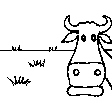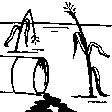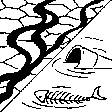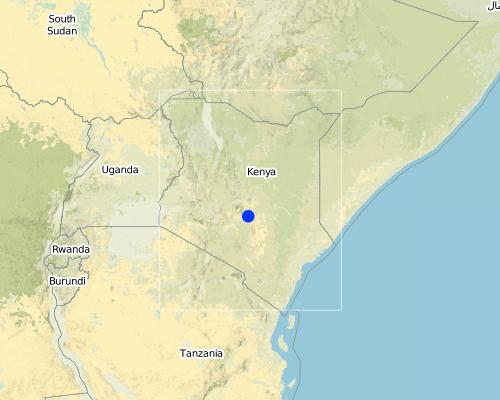Pasture Mangt. through Removal of comiphora [肯尼亚]
- 创建:
- 更新:
- 编制者: Unknown User
- 编辑者: –
- 审查者: David Streiff
Kumya Makuu (Kikamba)
technologies_1489 - 肯尼亚
查看章节
全部展开 全部收起1. 一般信息
1.3 关于使用通过WOCAT记录的数据的条件
(现场)数据是什么时候汇编的?:
20/04/2000
编制者和关键资源人员接受有关使用通过WOCAT记录数据的条件。:
是
2. SLM技术的说明
2.1 技术简介
技术定义:
Pasture management and improvement through weeding comiphora
2.2 技术的详细说明
说明:
The comiphora trees are ring barked at 2 feet high for the whole plant to die. This gives room for desired species to grow, retain moisture and add soil fertility through its decay. The land can also be given surface treatment through contour shallow ripping and dispersed grass seeding with desired species.
2.5 已应用该技术的、本评估所涵盖的国家/地区/地点
国家:
肯尼亚
区域/州/省:
Eastern
Map
×2.6 实施日期
如果不知道确切的年份,请说明大概的日期:
- 50多年前(传统)
2.7 技术介绍
详细说明该技术是如何引入的:
- 作为传统系统的一部分(> 50 年)
注释(项目类型等):
From the land users
3. SLM技术的分类
3.1 该技术的主要目的
- 减少、预防、恢复土地退化
- Improve soil fertility
3.2 应用该技术的当前土地利用类型

牧场
注释:
Major land use problems (compiler’s opinion): Reduction of the palatable grass species due to bush encroachment
Major land use problems (land users’ perception): DISAPPEARANCE OF SOME PALATABLE GRASS SPECIES AND SOIL EROSION
Grazingland comments: used to be communally grazing system, but has changed to individual
Type of grazing system comments: used to be communally grazing system, but has changed to individual
3.3 有关土地利用的更多信息
每年的生长季节数:
- 2
具体说明:
Longest growing period in days: 70 Longest growing period from month to month: Oct - Dec Second longest growing period in days: 60 Second longest growing period from month to month: Mar May
3.4 该技术所属的SLM组
- 改良的地面/植被覆盖
- 改良植物品种/动物品种
3.5 技术传播
具体说明该技术的分布:
- 均匀地分布在一个区域
如果该技术均匀地分布在一个区域上,请注明覆盖的大致区域。:
- < 0.1 平方千米(10 公顷)
注释:
Total area covered by the SLM Technology is 0.04 m2.
3.7 该技术强调的主要土地退化类型

土壤水蚀
- Wt:表土流失/地表侵蚀

化学性土壤退化
- Cn:肥力下降和有机质含量下降(非侵蚀所致)

水质恶化
- Ha:干旱化
注释:
Main type of degradation addressed: Wt: loss of topsoil / surface erosion
Secondary types of degradation addressed: Cn: fertility decline and reduced organic matter content, Ha: aridification
4. 技术规范、实施活动、投入和成本
4.2 技术规范/技术图纸说明
Technical knowledge required for field staff / advisors: low
Technical knowledge required for land users: low
Main technical functions: improvement of ground cover
Secondary technical functions: increase in soil fertility, Emergence of palatable spp
Change of land use type: From the land users
Other type of management: pasture management - From the land users
4.3 有关投入和成本计算的一般信息
其它/国家货币(具体说明):
Kenya shillings
注明美元与当地货币的汇率(如相关):1美元=:
70.0
注明雇用劳工的每日平均工资成本:
1.00
4.4 技术建立活动
| 活动 | 措施类型 | 时间 | |
|---|---|---|---|
| 1. | Barkringing of comiphora trees | 管理 | dry season |
| 2. | fencing/restricting livestock | 管理 | dry and wet seasons |
| 3. | shallow ripping | 管理 | dry |
| 4. | reseeding | 管理 | rainy season |
4.5 技术建立所需要的费用和投入
注释:
Duration of establishment phase: 12 month(s)
4.6 维护/经常性活动
| 活动 | 措施类型 | 时间/频率 | |
|---|---|---|---|
| 1. | controlled grazing | 管理 | all seasons / annually |
| 2. | repair of fence | 管理 | dry season / annually |
4.7 维护/经常性活动所需要的费用和投入(每年)
注释:
per hectare of land management
4.8 影响成本的最重要因素
描述影响成本的最决定性因素:
labour for bark ringing and fencing depending on the dencity of the comiphora
5. 自然和人文环境
5.1 气候
年降雨量
- < 250毫米
- 251-500毫米
- 501-750毫米
- 751-1,000毫米
- 1,001-1,500毫米
- 1,501-2,000毫米
- 2,001-3,000毫米
- 3,001-4,000毫米
- > 4,000毫米
农业气候带
- 半干旱
5.2 地形
平均坡度:
- 水平(0-2%)
- 缓降(3-5%)
- 平缓(6-10%)
- 滚坡(11-15%)
- 崎岖(16-30%)
- 陡峭(31-60%)
- 非常陡峭(>60%)
地形:
- 高原/平原
- 山脊
- 山坡
- 山地斜坡
- 麓坡
- 谷底
垂直分布带:
- 0-100 m a.s.l.
- 101-500 m a.s.l.
- 501-1,000 m a.s.l.
- 1,001-1,500 m a.s.l.
- 1,501-2,000 m a.s.l.
- 2,001-2,500 m a.s.l.
- 2,501-3,000 m a.s.l.
- 3,001-4,000 m a.s.l.
- > 4,000 m a.s.l.
关于地形的注释和进一步规范:
Slopes on average: Not more than 8%
5.3 土壤
平均土层深度:
- 非常浅(0-20厘米)
- 浅(21-50厘米)
- 中等深度(51-80厘米)
- 深(81-120厘米)
- 非常深(> 120厘米)
土壤质地(表土):
- 粗粒/轻(砂质)
表土有机质:
- 低(<1%)
如有可能,附上完整的土壤描述或具体说明可用的信息,例如土壤类型、土壤酸碱度、阳离子交换能力、氮、盐度等。:
Soil texture: Coarse/ light (sandy) with tiny stones
Soil fertility is medium with controlled erosion
Topsoil organic matter is low due to limited vegetation cover
Soil drainage / infiltration is good because of sandy soil
Soil water storage capacity is low
5.6 应用该技术的土地使用者的特征
非农收入:
- 低于全部收入的10%
相对财富水平:
- 平均水平
说明土地使用者的其他有关特征:
Population density: 10-50 persons/km2
Annual population growth: 2% - 3%
100% of the land users are average wealthy and own 100% of the land.
Off-farm income specification: most of the landuser depend on the farms
5.8 土地所有权、土地使用权和水使用权
土地所有权:
- 个人,有命名
土地使用权:
- 租赁
6. 影响和结论性说明
6.1 该技术的现场影响
生态影响
水循环/径流
地表径流
SLM之前的数量:
20
SLM之后的数量:
8
土壤
土壤流失
SLM之前的数量:
3
SLM之后的数量:
1
6.4 成本效益分析
技术收益与技术建立成本相比如何(从土地使用者的角度看)?
短期回报:
稍微积极
长期回报:
非常积极
技术收益与技术维护成本/经常性成本相比如何(从土地使用者的角度看)?
短期回报:
积极
长期回报:
非常积极
6.5 技术采用
- 1-10%
如若可行,进行量化(住户数量和/或覆盖面积):
7 households in an area of 0.4 ha
在所有采用这项技术的人当中,有多少人是自发地采用该技术,即未获得任何物质奖励/付款?:
- 90-100%
注释:
2% of land user families have adopted the Technology without any external material support
7 land user families have adopted the Technology without any external material support
Comments on spontaneous adoption: estimates
There is a little trend towards spontaneous adoption of the Technology
Comments on adoption trend: men land owners ring bark comiphora as they graze animal. Usally they are 50-60 years old and those with many.
7. 参考和链接
7.2 参考可用出版物
标题、作者、年份、ISBN:
Farm management hanbook of Kenya
可以从哪里获得?成本如何?
MOA Nairobi
链接和模块
全部展开 全部收起链接
无链接
模块
无模块


